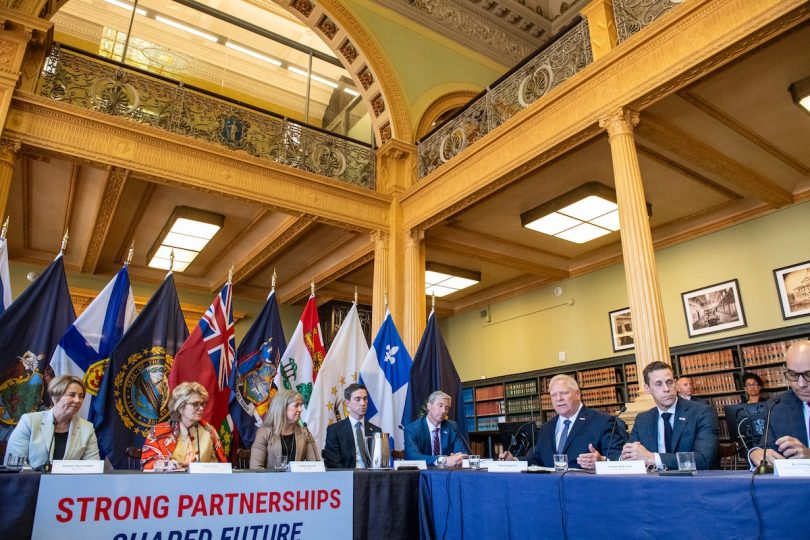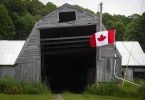Northeast U.S. Governors and Canadian Premiers discuss the impacts of President Trump’s tariffs on trade and how American and Canadian leaders can work to create beneficial economic relations between each other.JOSEPH PREZIOSO/AFP/Getty Images
A group of Canadian premiers and American governors are urging Prime Minister Mark Carney and U.S. President Donald Trump to strike a deal at this week’s G7 summit that eases U.S. tariffs on Canadian imports and ends the American leader’s threats to annex Canada.
The call was made at a Monday meeting in Boston between Eastern Canadian premiers and state governors from the U.S. northeast. It was issued before the White House announced that Mr. Trump was leaving the Group of Seven summit in Kananaskis, Alta., a day early because of the escalating conflict in the Middle East. Canadian officials said the two countries had plans to continue talks later this week.
Carney accelerates talks with Trump to reach economic-security deal within 30 days
Canadian travel boycott hurting U.S. tourism industry, northeast governors say
At the Boston gathering, American lawmakers also pointed to significant declines for the U.S. tourism industry as a result of the tariffs, as Canadians avoid travel south.
Ontario Premier Doug Ford said it’s a positive sign that the Prime Minister and the President met one-on-one at the G7 summit earlier in the day.
In a readout from the meeting issued by the Prime Minister’s Office late Monday, Mr. Carney and Mr. Trump agreed to pursue negotiations toward a new deal within 30 days.
Mr. Trump, as he began his first full day at the summit earlier Monday, told reporters that “not so much” is holding up an economic and security deal with Canada.
Mr. Ford, speaking at a press conference in Boston before the evening’s PMO readout, said Mr. Trump has to understand that his tariff war with Canada and other allies is only hurting the U.S., as Ontario looks to manufacture more of its own products, such as aluminum cans, instead of importing them from the U.S.
“Hopefully it will sink in to President Trump, this is serious,” Mr. Ford said.
“I can’t stress the urgency for both Prime Minister Carney and President Trump to strike some sort of deal to give people certainty. That’s what we need, we need certainty. Investors need certainty.”
Massachusetts Governor Maura Healey, host of the meeting of premiers and governors at her state’s legislative building, told the press conference it would be “crazy for there not to be a resolution” between Ottawa and Washington at the G7.
“I just hope that we see through that this week at the G7 and that there be a resolution there, so that we all can get on with our lives and innovate and grow our economies,” she said.
Governors and premiers at the meeting reiterated the importance of a strong relationship between Canada and the U.S.JOSEPH PREZIOSO/AFP/Getty Images
The Boston gathering included premiers or senior ministers from Quebec, Nova Scotia, New Brunswick, Newfoundland and Labrador, and Prince Edward Island, as well as governors and representatives from New York, Connecticut, Maine, Rhode Island and Vermont. All of the U.S. governors involved are Democrats, except Vermont’s Phil Scott.
Mr. Scott, who noted Northern governors have been meeting with Eastern premiers since 1973, said 50 per cent of Vermont’s energy comes from Canada, including 25 per cent from Hydro Quebec. He said 100 per cent of the natural gas and 80 per cent of fuel also comes from Canada.
“That tells you how important Canada is to the States. But we need each other in order to survive in the future,” he said at the press conference.
Mr. Scott added that he believes the U.S. needs to wean itself off carbon fuels and accommodate rising demand for electricity with new nuclear energy, noting Ontario’s plans to expand its nuclear capacity.
Not mentioned at the press conference was Mr. Ford’s brief 25-per-cent surcharge on electricity exports in March, which he quickly rescinded after Mr. Trump threatened to double steel and aluminum tariffs. Mr. Trump doubled those levies anyway earlier this month.
New York Governor Kathy Hochul said Mr. Trump’s tariffs, if fully rolled out as previously threatened, could cost hundreds of thousands of American jobs, noting longstanding warm relations between border states and provinces.
“These are relationships that have now been damaged because of rhetoric out of Washington, as well as tariffs,” Ms. Hochul said at the press conference.
The governors also outlined how Mr. Trump’s tariffs have damaged tourism in their states, with Ms. Healey estimating that Canadian visits are down in the region between 20 and 60 per cent, including 45 per cent in Vermont and New York City. She added there are serious impacts and disruptions to supply chains as well, and that Canadians are concerned about travelling to the U.S. for safety reasons.
Maine’s Democratic Governor, Janet Mills, said almost a million Canadians a year usually visit her state, with a population of just 1.4 million. But she said he knows that Mr. Trump’s talk about making Canada the 51st state has prompted many to stay away, with tourism falling 26 per cent between February and April this year.
“I understand the hostility that people of Canada must feel from that rhetoric,” Ms. Mills said at the press conference regarding Mr. Trump’s annexation threats. “I feel that, too. It hurts all of us.”
Nova Scotia Premier Tim Houston said state and provincial leaders must concentrate on the things they can control, which do not include the U.S. President’s annexation statements that have often been levelled on social media.
“We can’t control what people tweet in the middle of the night,” he said at the press conference.










